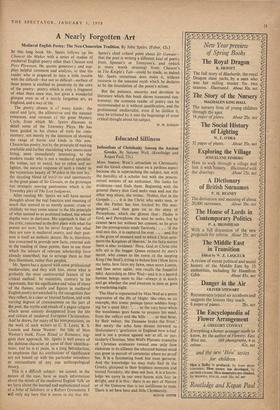A Nearly Forgotten Art
Mediaeval English Poetry: The Non-Chaucerian Tradition. By John Speirs. (Faber, 42s.) IN this long book Mr. Speirs follows up his Chaucer the Maker with a series of studies of medieval English poetry other than Chaucer and Piers Plowman. He quotes generous'y and sup- plies helpful comment and analysis, so that the reader who is prepared to take a little trouble with the difficult—but not so difficult—surface of these poems is enabled to penetrate to the core of the poetry : poetry which is only a fragment of what there once was, but gives a wonderful glimpse even so of a nearly forgotten art, an England, and a way of life. The poetry chosen is cf many kinds: the carol and lyric, the alliterative and the stanzaic romances, and versions cf the great. Mystery Cycle, from which Mr. Speirs" discusses in detail some of the Towneley Plays. He has been guided in his choice of texts for com- mentary, not merely by the intention of showing the range of forms and kinds in this non- Chaucerian poetry, but by the principle of making available and further elucidating what seems most living, most immediately interesting, to the modern reader who is not a medieval specialist. He wishes, not to annul, but to refine and en- lighten, the natural response of such a reader to the mysterious beauty of 'Maiden in the mor lay,' the dazzling blend of tracl.:on and spontaneity in the great poem of Sir Gawain, or the grotesque but strangely moving pantomime which is the Towneley play of The Last Judgment. After reading Mr. Speirs we will have second thoughts about the real function and meaning of much that seemed to us merely quaint, crude or childish; we may come nearer to the life-principle of what seemed to us profound indeed, but whose depths were in darkness. His approach is that of the critic, concerned in the first place with what the poems are now; but he never forgets that what they are now is medieval poetry, and their past- ness is itself an aesthetic datum. He is, therefore, less concerned to provide new facts, external aids to the reading of these poems, than to use those which the labours of relevant scholarship have already unearthed; but to arrange them so that they illuminate, rather than perplex. Mr. Speirs has a quarrel with some professional medkevalists, and they with him, about what is probably the most controversial feature of his critical method : he maintains, contrary to his opponents, that the significance and value of many of the themes, motifs and figures in medieval English poetry are enriched by the recognition that they reflect, in a clear or blurred fashion, and with varying degrees of consciousness on the part of the poet, the myths and rituals of a pagan religion which never entirely disappeared from the life and culture of medieval European Christendom. And he draws, for many of his interpretations, on the work of such writers as C. S. Lewis, R. S. Loomis and Jessie Weston: the title of Miss Weston's book, From Ritual to Romance, sug- gests their approach. Mr. Speirs is well aware of the dubious character of some of their identifica- tions; and he is at pains, in a long Introduction, to emphasise that his attributions of significance are not bound up with the particular soundness or unsoundness of any one anthropological theory. This is a difficult subject: we cannot, in the nature of the case, have as much information about the minds of the medieval English 'folk' as we have about the learned and sophisticated mind of a John of Salisbury or a Robert Grosseteste. I will only say here that it seems to me that Mr. Speirs's chief critical point about Sir Gawain- that the poet is writing a different kind of poetry from Spenser's or Tennyson's, and (which is more worth stressing) from Chaucer's in The Knight's Tale—could be made, as indeed Mr. Speirs sometimes does make it, without recourse to the seasonal myth which he declares to be the foundation of the poem's action. But the patience, sincerity and devotion to literature which this book shows transcend con- troversy; the common reader of poetry can be recommended to it without qualification, and the professional medievalist, even if he dislikes it, may be irritated by it into the beginnings of some critical thought about his subject.
W. W. ROBSON










































 Previous page
Previous page